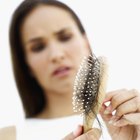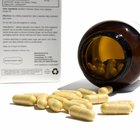The Mayo Clinic describes baldness as “excessive hair loss from your scalp” because of heredity, medications or medical conditions. Baldness isn’t limited to men; it can affect women and children of any age. Numerous products are available to treat hair loss and baldness; L-arginine is one of them.
Features
L-arginine is an amino acid, essential to human life as building blocks of protein. Though the body synthsizes it in plenty, supplementation is sometimes necessary.
What makes L-arginine a supplement for hair growth is its power to increase the level of nitric oxide (NO), the gas, in the body. According to HairLossTalk, “the body takes L-arginine and manufactures NO from it.” Nitric oxide increases blood flow, relaxes blood vessels and plays a role in stimulating hair growth.
Forms & Dosage
L-arginine is a main component in dairy and poultry products as well as beef, fish and nuts. Supplements are available in capsule and powder form. HairLossTalk recommends, “Much smaller amounts of supplemental L-arginine in the 1 to 2 g (1,000-2,000 mg) range are probably adequate for supplying the body with the raw materials needed to optimize NO production.” Before including L-arginine in your diet, consult with a physician.
Hair Growth
Although supplements are available, many people have experimented using L-arginine topically to promote hair growth. L-arginine creams are expensive, and it’s not an FDA-approved treatment. Products with arginine arrest causes of poor follicle development and weakened cuticle shaft while assisting hair growth. A cream with 2 to 5 percent L-arginine is a “reasonable experimental strength,” according to experts at HairLossTalk. It’s roughly equivalent to 40-100 mg per half-teaspoon.
Warning
An article published in the National Library of Medicine warns people of severe allergic reaction after arginine is injested. Signs of allergy include rash, itching and shortness of breath.
Although many can tolerate arginine without any problem, some might experience stomach discomfort, including nausea and cramps. Arginine can aggravate and worsen symptoms in asthmatic people.
Other side effects include increased blood sugar and low blood pressure. It is not recommended during pregnancy or breastfeeding.
Other Uses
The U.S. Food and Drug Administration (FDA) has approved arginine to increase growth hormone levels in people. This has made arginine supplements immensely popular in bodybuilding community.
It’s also a viable and a less expensive alternative to Viagra to achieve sexual satisfaction for men and women. Similar to Viagra, arginine increases blood flow to the genitals, increasing sensation and pleasure.
Related Articles

L-Lysine for Hair Growth

What Are the Benefits of Extrapone ...

Wild Yam for Hair Growth

Can Herbs Flush Cellulite?

Is Zinc Good for Hair Growth?

Pycnogenol and Acne

Nac & Hair Growth

A List of Foods That Contain Choline

What Vitamins Help the Liver?

How to Reduce Acne Inflammation

Side Effects of Monosodium Glutamate

Viviscal Ingredients

What Are the Dangers of Fraxel Repair?

Tips to Grow Pubic Hair

Ingredients in Hairfinity Vitamins

Shampoos for Hair Loss Due to ...

Are Bean Sprouts Good for You?

Recommended Daily Dosage of Saw ...

Can Drinking Nettle Tea Reduce DHT ...

Zinc Treatment for Rosacea
References
Writer Bio
Reena Das is a professional freelance writer prominently featured on many online publications. She specializes in well-researched articles on parenting, education, shopping and relationships, among other topics. Das holds a master's degree in English literature and a bachelor's degree in education. She has been pursuing her passion for creative writing since 2005.